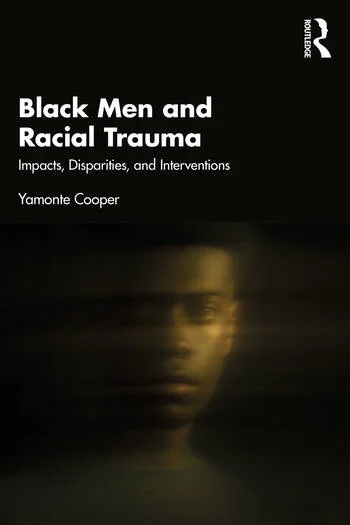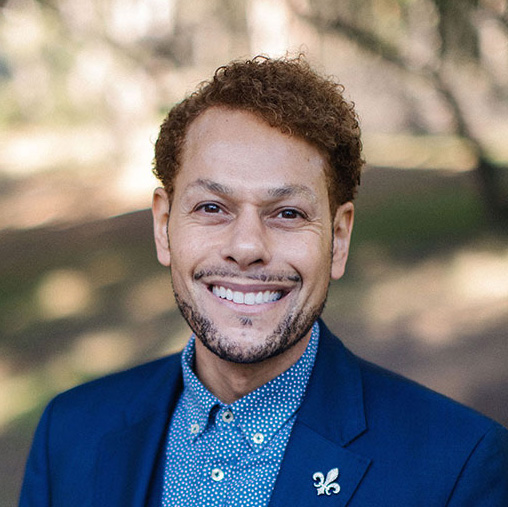This volume comprehensively addresses racial trauma from a clinical lens, equipping mental health professionals across all disciplines to be culturally responsive and trauma-informed when working with Black men.
Written using a transdisciplinary approach, Yamonte Cooper presents a Unified Theory of Racism (UTR), Integrated Model of Racial Trauma (IMRT), Transgenerational Trauma Points (TTP), Plantation Politics, Black Male Negation (BMN), and Race-Based Shame (RBS) to fill a critical and urgent void in the mental health field and emerging scholarship on racial trauma. Chapters begin with specific definitions of racism before exploring specific challenges that Black men face, such as racial discrimination and health, trauma, criminalization, economic deprivation, anti-Black misandry, and culturally-specific stressors, emotions, such as shame and anger, and coping mechanisms that these men utilize. After articulating the racial trauma of Black men in a comprehensive manner, the book provides insight into what responsive care looks like as well as clinical interventions that can inform treatment approaches.
This book is invaluable reading for all established and training mental health clinicians that work with Black men, such as psychologists, marriage and family therapists, social workers, counselors, and psychiatrists.

Buy Online
Reviews & Endorsements
“This highly illuminating book offers an encyclopedic examination of the conditions that confront Black boys and men in the 21st Century. Cooper writes in a very understandable and comprehensible way that presents the everyday reader an opportunity to have a complicated topic within their reach. Black Men and Racial Trauma forces us to confront complex realities that many researchers have attempted to downplay as a rosier picture than the data in this book provides.”
“This is a book like no other that I have read. It informs and horrifies about the pervasive effects of racism. We find definitions of racism and are educated about all the different kinds ranging from prejudice to systemic racism and anti-Black racism to white supremacy all embedded in a historical context. The effect of racism on mental and physical health, and on trauma, crime and mortality are all documented. Reading all this solidifies an understanding of the devastating effect of racism, based on empirically-based knowledge rather than on opinion. To add to all this, we are provided with a clinical understanding of racism on Black emotions, especially, shame and anger and helpful suggestions for interventions both psychotherapeutic and social. This is a book for the times.”
“Yamonte Cooper examines the unique ways in which structural racism harms Black men, particularly with respect to exposure to deadly violence and disproportionate downward mobility across generations. Marshalling the best available evidence from social science research, Cooper has produced an unparalleled study of the social injuries inflicted upon Black men and what steps should be taken to prevent continued damage.”
“The challenges of being a male of African descent in America continue to exert a profoundly negative impact on the experiences of Black people generally, but specifically Black males themselves. And yet, if those adversities are only understood at the level of the surface structure, then that analysis fails to capture the deep structured intricacies that impact Black men not only physically, but also psychologically. This text on Black Men and Racial Trauma expertly chronicles the fact that the disruption of Black Men’s intellectual, emotional, behavioral, and spiritual sensibilities is not mere racial inconvenience or bias, but rather a more insidious form of traumatic psychic debilitation and dehumanization. Dr. Cooper doesn’t leave the reader there but expands his narrative to include coping mechanisms Black men employ, and intervention strategies that clinicians, counselors, therapists, and others can use to help Black men not only cope but thrive. This text is a necessary addition to the arsenal on treating African descent people, and I would encourage and recommend that you absorb its content and consider implementing its recommendations.”
“Cooper’s text is probably the most important statement on the connection between race, gender, and stress since the appearance of Alvin Poussaint and Amy Anderson’s 2001 study on the biological, medical and mental health correlates of race-related stress.”
“Black Men and Racial Trauma: Impacts, Disparities, and Interventions is a survey that moves far beyond the usual identification and definition of racism to enter into the realms of healing and recovery.
As such, its focus both compliments books already on the market and elevates the reader’s knowledge of racial trauma and its lasting, wide-ranging impact on Black men. Even more important, however, is its approach to recovery processes. As Yamonte Cooper, a licensed clinical counselor, navigates the milieu of racial bias and its deep-rooted wellsprings and impact, so he creates opportunities for dialogue and discovery that go above and beyond rote theory.
The first chapters attend to defining racism, mental health, racial trauma, and the coping mechanisms Black men have traditionally employed to overcome a rigid and relentless social paradigm that has not just ruled their lives, but shaped their reality.
Cooper creates many novel approaches to his subject, first identifying the physiological and mental impact of racism on Black men:
Black Americans experience earlier deterioration of health than whites. The inherent stress of living in a racist society that stigmatizes and disadvantages Black men may cause disproportionate physiological deterioration that may manifest the morbidity and mortality that would be typical in a significantly older white individual.
As Cooper chronicles the many impacts of racism, his concurrent attention to the equal possibilities of healing creates a discourse on racial profiling, disparities, and history that moves between subjects of developing Black capitalism and mindset to social techniques employed to undermine Black male agency. These sometimes arise from unexpected places, such as feminist efforts.
Eye-opening and certain to be controversial, Cooper’s analysis, contentions, and revelations are firmly rooted not just in psychology and mental health, but in social and historical analysis. This creates a powerful set of insights not to be found in any other book on black males, their psychology, or social analysis.
The clinical eyes of mental health professionals working from various disciplines are incorporated into an analysis that interrogates gender constructs, with footnoted references accompanying scholarly insights:
Blackness ruptures Western ideas of gender but the complex lives of Black people who don’t fit into the universalist accounts and narratives of grand theories such as Black feminism, queer theory, or Marxism are censored in order for these theories to remain legitimate. There is no empirical evidence to support the idea that race, class, and gender are defining aspects of interactions between groups.
Between group dynamics, ideological worldviews and politically driven assumptions, and depictions of groups, Cooper’s wide-ranging discussions offer important food for thought for not just psychologists, social workers, and healers, but college-level classrooms discussing racial bias, racism’s history and impact, and new methods of addressing repression.
The result is a powerful discourse highly recommended for libraries interested in scholarly works about racism and healing; for book reader discussion groups debating history, precedent; and for clinicians working directly with Black males and populations, who will find invaluable such insights as:
Anti-Black misandry manifests in beliefs that Black males are not victims of societal sexual violence but perpetrators, which denies them of the ability to be victims of sexually predatory acts. It is not unlikely that untreated Black male victims of sexual violence are living with trauma. Therefore, it is imperative that clinicians provide compassionate and responsive care in order to afford them the opportunity to heal and not be consumed by the wound of trauma.
In short: any collection covering cultural anthropology, racial bias, clinical healing, or trauma recovery should not only make Black Men and Racial Trauma a mainstay, but should keep it prominently displayed for recommendation to any patron interested in a deep analysis and applied mental healthcare that moves from individual experience and circumstance to broader racial concerns.”


